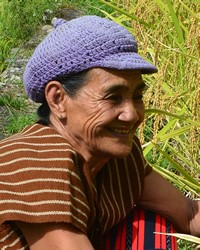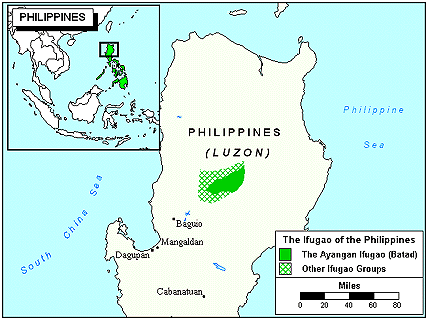The Ifugao live in the province of Ifugao, a mountainous region in the northern part of the island of Luzon, the most populous island of the Philippines. The Ayangan Ifugao, or Batad Ifugao, are a large subgroup of the Ifugao living in the village of Batad. The Ifugao language belongs to the Austronesian language family, and while this is the people's primary language, the Ifugao also speak Ilocano, Tagalog and English.
Until the early twentieth century, the Ifugao lived in isolation from the outside world. During the American governing of the Philippines, however, the Ifugao came into contact with American military officers and schoolteachers. In later years, transportation improved, and people began to travel to large cities to earn wages. Ifugao society has continued to modernize, and the rice terraces in Batad make it a popular spot for tourism, but the Ifugao there still retain deep ties to tradition.
The Ifugao are famous for their advanced system of terraces cut into the sides of the mountains. The terraces are irrigated by diverted streams and springs that flow through them.
The Ifugao follow a three-class social system consisting of the aristocrats (or kadangyan), the middle class (or tagu) and the lower class (or nawotwot). Farming plays an important role in the lives of the Ifugao. The people rely heavily on wet rice terraces but also utilize a “slash-and-burn” farming method to grow crops such as sweet potatoes and corn. In the latter approach, they cut down a section of a forest, burn the plant debris, and plant crops in the resulting clearing. The rice terraces are an important part of life for the Batad Ifugao. The Ifugao host feasts, follow agricultural rites, and feature rice wine in rituals and special occasions. Social status is also partially measured by the number of rice field granaries one owns. For food, the people also grow vegetables on the terraces and go to the surrounding forest to hunt and gather. The people eat some meat, including chicken and pig.
Traditional Ifugao instruments include gongs, stringed instruments and flutes. Music plays a unique role in Ifugao courtship practices. When courting, men and women are placed in separate houses. Men visit the women to sing romantic songs, and the women also reply in song. A married elder or childless widow supervises this process and provides updates to parents of the men and women involved.
Today, Roman Catholicism is popular among the wider Ifugao people. Traditionally, the Batad Ifugao followed a complex, animistic religion and participated in several rituals. They believed there were many hundreds of deities with a variety of specific roles. The chief deity of their belief went by the names Kabunian, Mah-nongan or Afunijon (in some places, these names referred to several of their deities). The Ifugao are known for their bulul carvings, which were believed to house ancestral spirits and were put in rice granaries to protect the rice crops. The Ifugao believed in six realms of the universe: the Spiritual world, the Sky world, the Earth world, the Underworld, the Western world, and the Eastern world. A shaman led the people in rituals.
Protestant Christianity has recently made progress among the Ifugao people. There are people from the Batad Ifugao community who can potentially disciple others in the ways of Christ.
Ifugao society has changed within the past century. Although remote, Batad has become a popular site for tourism, and it now features aspects of both traditional ways and modernization. While Ifugao society has changed, there remains a great spiritual need among these people. Missionaries have often worked among the Ifugao, and a New Testament translation is currently underway for the Ayangan Ifugao. There are Christian believers among them who can take the gospel to others.
Pray for God to send laborers into the Philippines who will observe the culture and minister to the needs of the Batad Ifugao.
Pray the Batad Ifugao would trust in Jesus without combining the message of Christianity with traditional religion.
Pray for God to grant favor, wisdom and boldness to Christians among the Batad Ifugao as they seek to share the gospel.
Pray for New Testament translations to spread quickly throughout Batad.
Scripture Prayers for the Ifugao, Batad in Philippines.
https://www.afar.com/places/batad-rice-terraces-banaue
https://en.wikipedia.org/wiki/Ifugao_people
https://www.csueastbay.edu/museum/virtual-museum/the-philippines/peoples/ifugao.html
https://www.sapiens.org/archaeology/ifugao-weaving/
https://www.johnspecialobjects.nl/en_GB/c-3605517/ifugao-tribe/
https://www.metmuseum.org/art/collection/search/626371
| Profile Source: Joshua Project |











